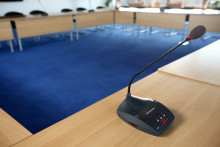The Drienerlo democracy, you say?
Yes, although that is a bit strongly phrased. Now that we've got your attention, universities have their own democratic structures. Just as we have a parliament, provincial councils and municipal councils in the Netherlands, universities also have their own representatives for many years. In other words: participation bodies. And since they are representatives of the people, you can also vote for them.
Who can I vote for?
We'll come back to that in a moment. It is important to first make clear the distinction between central and decentral participation. The central participation body is better known as the University Council. It consists of nine students and nine employees. Then there is the decentral participation: these are the faculty councils (say a university council, but at every faculty) and service councils (similar, but in the support service departments). And then there are the programme committees. Such a committee regularly consults with the programme director about the content and quality of a study programme.
Okay, okay. But who can I vote for?
As a student you can vote for students, as an employee you can vote for employees. Are you a student? Then you have the choice between student parties UReka and DAS. Depending on which faculty you are studying at, you can also vote for a fellow student for the faculty council elections. Since last year, the UT has had one central election week in which you can cast your vote for both central and decentral participation.
Are you an employee? Then the choice is a bit more limited. There is only one employee party participating in the University Council elections: Campus Coalition provides eleven candidates for nine seats. The battle for seats will therefore be primarily an internal matter. In the case of decentral participation, faculty council elections take place at all faculties, with the exception of ITC. In the case of the service councils, however, there is nothing to choose from; There are more seats than eligible candidates.
What does such a participation council actually do for me?
In short: having a lot of meetings. And in doing so, they are supposed to represent your interests as a student or employee. After all, they are elected representatives for a reason. So such a participation council sits down with an Executive Board, Faculty Board or management of a service department to discuss – for example – budget cuts, housing plans, student wellbeing, activism and – at least as important – whether or not bicycles are allowed to park on the O&O square.
How much power do the participation bodies have?
That has changed considerably over the years, as Harry de Boer, researcher at the Center for Higher Education Policy Studies, previously explained. In the 1970s, it was even the case that a university council determined policy and the executive board was little more than the implementing body. Nowadays that would be hard to imagine, although the participation council still has some sway. In addition to the right of initiative (coming up with its own proposals) and the right of advice, the participation bodies also have the right of consent on various issues. That is a disguised right of veto. This is a fairly heavy measure, but it has not been used by the University Council for years, not even when there was great dissatisfaction with the budget recently.
How can I vote?
Unlike the European elections, you don't have to go to a ballot box. The ballot box is coming to you. On Monday, every student and staff member will receive a link to the election page by e-mail. Voting is open from 9 a.m. on Monday morning until 12 p.m. on Friday 14 June. The election results will be known on the same day.







